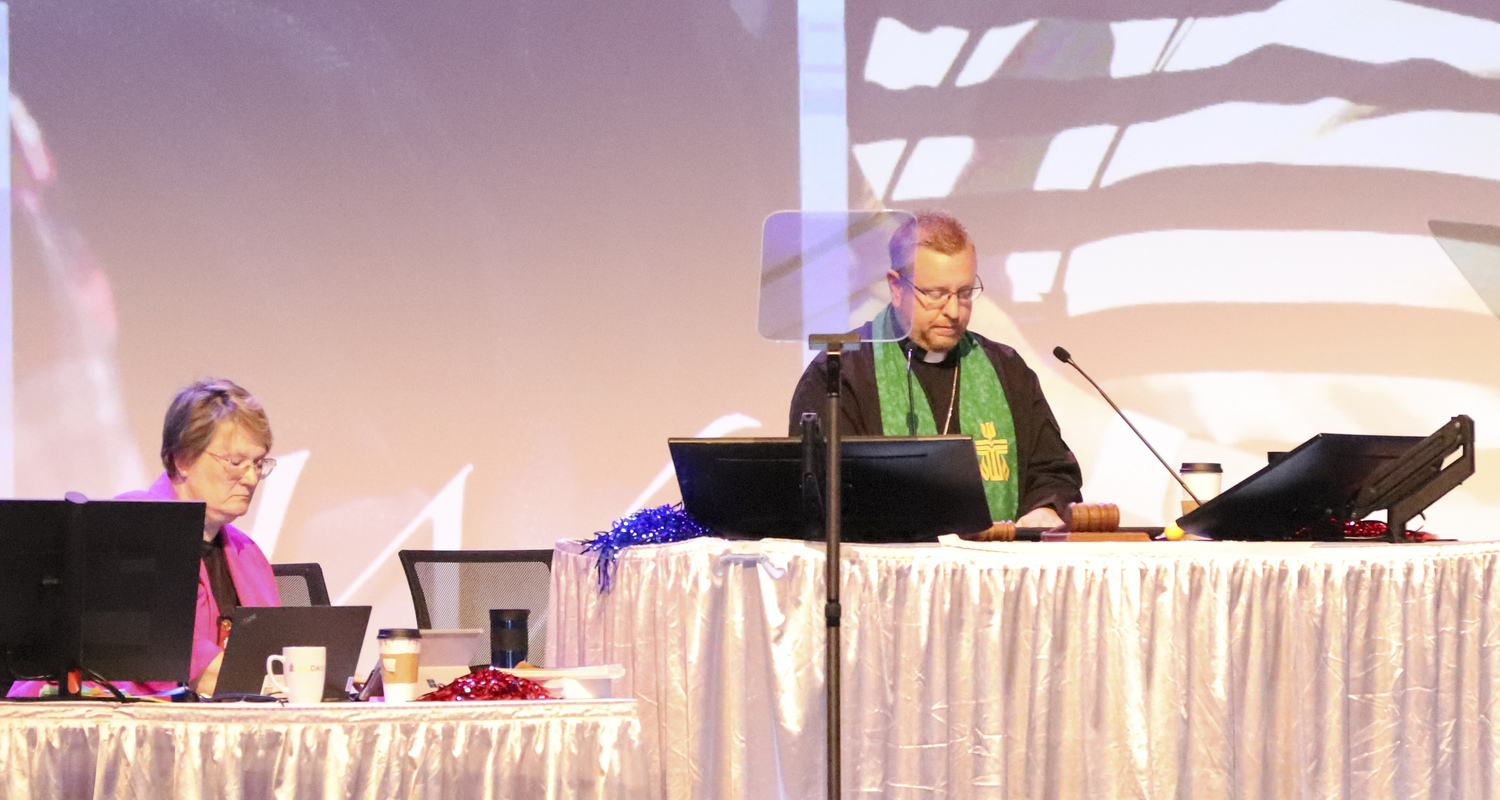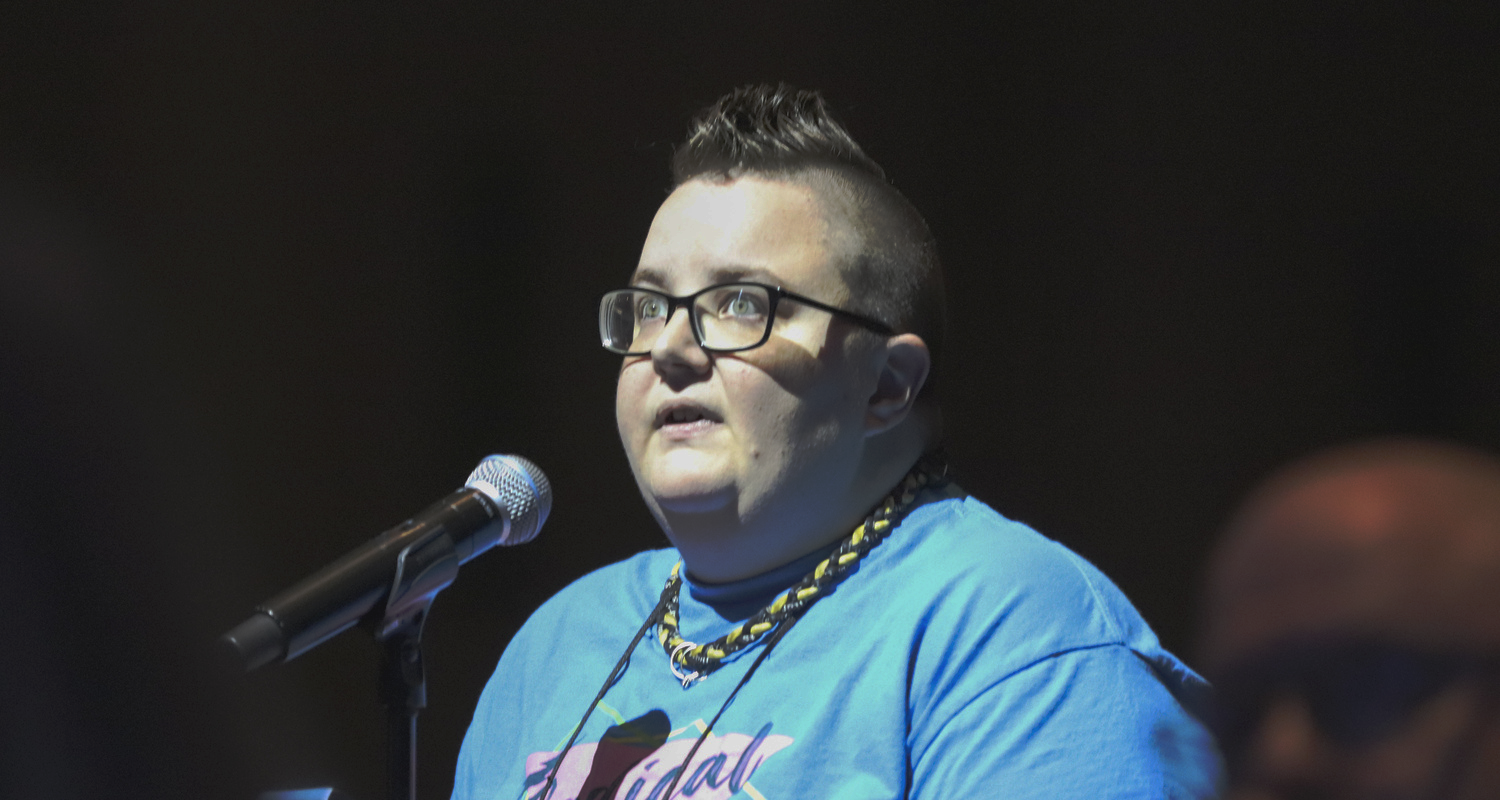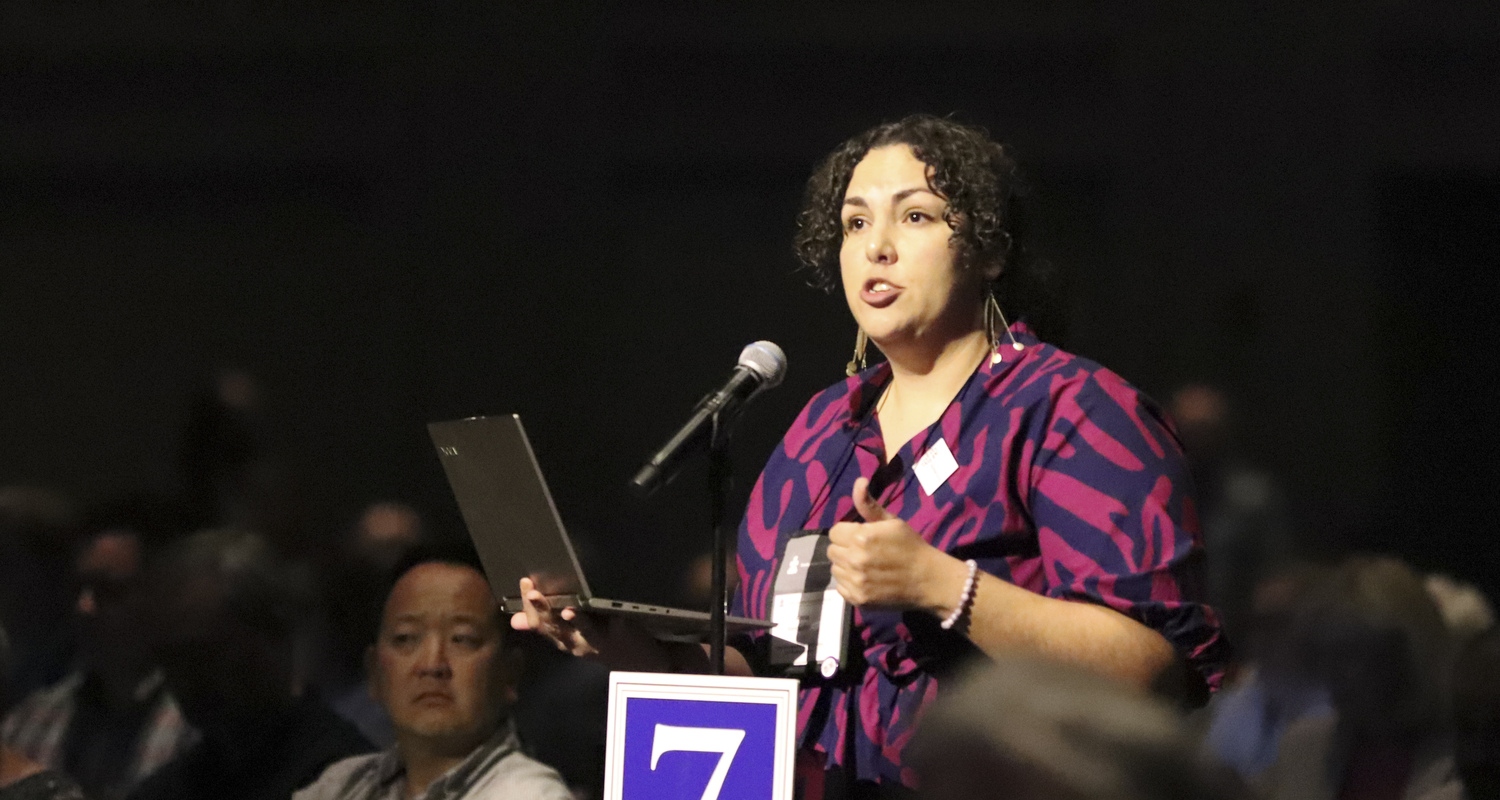
GA226 Co-Moderator the Rev. Tony Larson guides the business of the Assembly during the 10th plenary meeting on July 3, 2024. Photo by Kristen Gaydos
While the 10th plenary session of the 226th General Assembly focused most of its time discussing the so-called “Olympia Overture,” the Wednesday morning plenary began with thoughtful wisdom in both word and action from leadership and other speakers that set the tone for later debate. Doug Tilton, World Mission’s regional liaison to Southern Africa, opened the gathering with a prayer that recognized our call to be “one beloved community” even if “we’re not always sure we’re cut out to be followers of Christ.” Tilton asked God to bless the Assembly with patience and compassion for the work ahead.
After opening in prayer, the Assembly heard from the Rev. Sandra Reis Oliveira of the Presbyterian Church of Portugal. Oliveira spoke of the small size, but great faith of her denomination, which consists of only a few thousand members and a handful of clergy, but which remains the oldest Protestant denomination in Portugal.

Jesy Littlejohn, a ruling elder commissioner of National Capital Presbyter speaks on an item of business during the Assembly’s 10th plenary meeting on July 3, 2024. Photo by Kristen Gaydos
Conversation then turned to the Polity Committee’s work, starting with parts 1 and 2 of POL-01, which both originated from an overture out of Olympia Presbytery. The overture was split into two parts by the committee before both were handed up to the Assembly.
POL-0101 recommended that F-1.0403 be changed to include “gender identity” and “sexual orientation” in the list of protected classes recognized by the PCUSA as being guaranteed full participation and representation in the life of the church. This item was passed by the Assembly by a 389-24 count with little discussion.
POL-0102 recommended a related change to G-2.0104b, seeking to add “the principles of participation and representation found in F-1.0403” to the list of topics those seeking ordination in the denomination are required to be asked about. The words “and nondiscrimination” were removed from the overture’s original recommendation via amendment during committee. Polity Committee Moderator the Rev. Anne Weirich informed the assembly that this item was passed by the committee by nearly a two-thirds majority.
Lengthy discussion took place on this item, with passionate arguments both in favor and against. Those speaking in favor predominantly highlighted the need to live into the values the church claims regarding the inclusion of LGBTQIA+ people and clarified that this change to the Book of Order would not require candidates to give a particular answer or for examining bodies to respond in a prescribed way.
However, many of those arguing against the item argued that the requirement would nevertheless serve as a way to gatekeep the denomination and keep those who are non-affirming from serving in ordained leadership. The fear, these opponents argued, is that this clause would prevent the denomination from being able to engage people across a broad swath of theological and ideological convictions. Young Adult Advisory Delegate Chase White argued that “for too long [the church] did not swing the gate wide enough” by excluding LGBTQIA+ people and that this overture would do the same to those who are more conservative, which “threatens our witness and allows us to be gatekeepers.”

Anna Kendig Flores, resource person for the General Assembly Committee on Representation, responds to questions during the 10th plenary meeting on July 3, 2024. Photo by Kristen Gaydos
The Rev. Brian Ellison, who serves as director of the Covenant Network of Presbyterians and worked on the Olympia overture, said the goal of part two was never “to create the appearance that conservatives couldn’t be in the church” but rather to create opportunity for authentic and honest conversation. As Teaching Elder Commissioner Rev. Jenny McDevitt said when speaking in favor of the item’s call for conversation, “It may be uncomfortable… faith is annoying that way.”
Multiple amendments to POL-0102 were proposed, beginning with a motion from Ruling Elder Dustin Wilsor, who proposed that the phrase “the Historic Principles of Church Order (F-3.01)” also be included in the list of required topics of questioning for ordination candidates to reaffirm the denomination’s commitment to “freedom of conscience.” This amendment passed by a vote of 216 yes, 192 opposed. Two other amendments were voted down, including one to add back in the word “nondiscrimination” by the same Polity Committee member who had first proposed that it be removed. In another lighthearted moment, Commissioner Tully Fletcher offered a grammatical correction to one proposed amendment, saying “this would be the third time the Assembly has passed something with bad grammar, and that’s my limit.”
Another major topic of conversation centered on whether the main motion, and various proposed amendments, were redundant to existing language. The Rev. Dr. Christian Boyd of the Advisory Committee on the Constitution was called to address these questions a number of times, and he repeatedly noted, “Yes, it is redundant, but you can do it if you want to.”
Speaking on the suggested redundancy of the main overture, Ellison said, “If the first part is about clearly stating our values, then the second part is about living into those values in practical and significant ways. So while I appreciate the assurance from the ACC that this addition will not radically upset the existing constitutional principle, the clarity it offers is really important for LGBTQIA people. Just as the Bible states some important things more than once.”
Before shifting to the vote, Co-Moderator the Rev. Tony Larson led the Assembly in prayer. Ultimately, the Assembly voted to approve POL-0102 with 297 in favor and 130 against. Both POL-01 items will now be sent to presbyteries for ratification.
The plenary closed with a final vote to approve POL-02, which addressed mandatory reporting for clerks, and was passed unanimously by committee. It was also passed by the Assembly with 401 in favor and 5 against.
